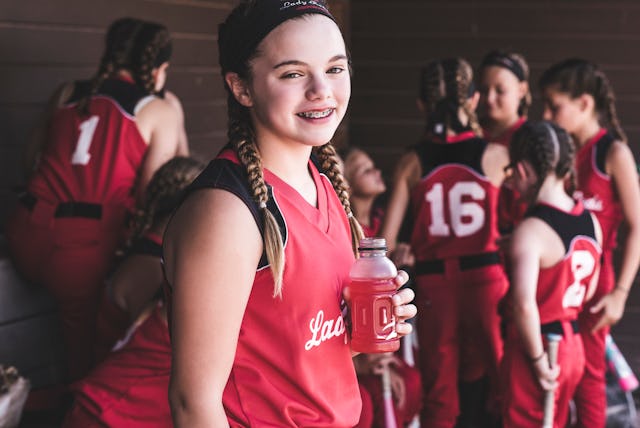Are Electrolyte Drinks Worth The Money? We Asked An Expert
The 411 on the best source of hydration for your active kid.

It's a common joke online: Millennials went their entire childhoods without drinking water, while their kids don't go anywhere without a water bottle. (Which they lose every 15 minutes.) But what about the stuff that's in the water? Do your kids need extra electrolytes? What's an electrolyte, anyway?
Scary Mommy talked to Katrina Hartog, a registered dietitian at Mount Sinai Hospital in New York, to get some more information. She laid it out: Electrolytes are necessary for basic bodily functions, and they can be lost during exercise. In order to replace them, we drink water and eat water-based foods.
But it turns out that electrolyte-enhanced drinks like Gatorade or Powerade are not the best way to replace them. In fact, they can do more harm than good.
Think Twice
Many of these drinks are chock full of calories. "The calories are coming from carbohydrates," Hartog says. "So yes, they have electrolytes, but these carbohydrate-containing sports drinks can lead to just excess calorie consumption ... because of the carbohydrate, it can actually cause dental erosion."
Some electrolyte drinks contain caffeine, which the American Academy of Pediatrics warns can be harmful for children under 12 since it's a stimulant and can negatively affect the heart.
"Those other kind of 'energy' sports drinks contain caffeine, which actually could be detrimental to your hydration," Hartog tells me. "It has an impact on your heart. And so you can imagine if [you're] participating in a lot of activity in a heated environment, you're sweating — you could really put a lot of strain on your [child's] heart."
What to Grab Instead
The best electrolyte drink for your child is just plain old water. And the recommendations are pretty straightforward, too: Hartog explains that children ages 4 to 8 need seven cups a day. Girls 9 and up need eight-and-a-half cups, while boys the same age need about 10 cups. (Once kids get into their late teens and adulthood, it’s based on body weight.)
The problem comes when your kid won't cooperate because water is too "boring," an issue that Hartog herself faces with her own 10-year-old. But rather than turning to the packaged stuff, she gets creative.
"I infuse the water [by] adding some fruit, because then it kind of naturally becomes sweet," she shares. "Sometimes I'll cut up strawberries, cucumber, cantaloupe, lemon, and it becomes like the fruit-infused water. Or I'll do the same thing [but] then freeze it in ice cubes." That keeps it cold longer, making it perfect for hot school days and sports practice. (And they get some bonus vitamins from the fruit.)
She also advises parents to give their kids snacks naturally containing water — fruits like berries and various melons, and veggies like cucumber, zucchini, and celery.
The TL;DR
Your kid is active but probably not exercising so much that electrolyte drinks are necessary (or to require you to spend your hard-earned money on them). They need to stay hydrated, but water will get the job done just fine.
"I think sometimes we do get overly ambitious about [needing] to stay hydrated, and 'I've sweat so much' ... [but] our bodies are wonderful about adapting," Hartog says. "If we're drinking fluids normally, whether that's pre-activity and then replacing post [activity], and eating a well-balanced diet, you're going to get what the body needs to maintain or readjust after you lose some fluid."